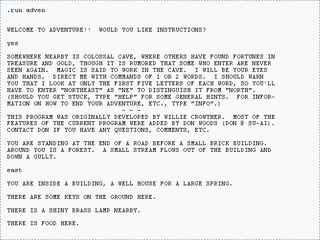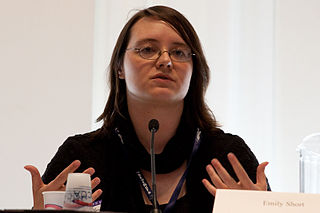
Interactive fiction, often abbreviated IF, is software simulating environments in which players use text commands to control characters and influence the environment. Works in this form can be understood as literary narratives, either in the form of interactive narratives or interactive narrations. These works can also be understood as a form of video game, either in the form of an adventure game or role-playing game. In common usage, the term refers to text adventures, a type of adventure game where the entire interface can be "text-only", however, graphic text adventures still fall under the text adventure category if the main way to interact with the game is by typing text. Some users of the term distinguish between interactive fiction, known as "Puzzle-free", that focuses on narrative, and "text adventures" that focus on puzzles.
The Interactive Fiction Competition is one of several annual competitions for works of interactive fiction. It has been held since 1995. It is intended for fairly short games, as judges are only allowed to spend two hours playing a game before deciding how many points to award it. The competition has been described as the "Super Bowl" of interactive fiction.
The Z-machine is a virtual machine that was developed by Joel Berez and Marc Blank in 1979 and used by Infocom for its text adventure games. Infocom compiled game code to files containing Z-machine instructions and could therefore port its text adventures to a new platform simply by writing a Z-machine implementation for that platform. With the large number of incompatible home computer systems in use at the time, this was an important advantage over using native code or developing a compiler for each system.
Inform is a programming language and design system for interactive fiction originally created in 1993 by Graham Nelson. Inform can generate programs designed for the Z-code or Glulx virtual machines. Versions 1 through 5 were released between 1993 and 1996. Around 1996, Nelson rewrote Inform from first principles to create version 6. Over the following decade, version 6 became reasonably stable and a popular language for writing interactive fiction. In 2006, Nelson released Inform 7, a completely new language based on principles of natural language and a new set of tools based around a book-publishing metaphor.
Text Adventure Development System (TADS) is a prototype-based domain-specific programming language and set of standard libraries for creating interactive fiction (IF) games.

Photopia is a piece of literature by Adam Cadre rendered in the form of interactive fiction, and written in Inform. It has received both praise and criticism for its heavy focus on fiction rather than on interactivity. It won first place in the 1998 Interactive Fiction Competition. Photopia has few puzzles and a linear structure, allowing the player no way to alter the eventual conclusion but maintaining the illusion of non-linearity.

ADRIFT is a graphical user interface used to create and play text adventures. The name is an acronym for "Adventure Development & Runner - Interactive Fiction Toolkit". The project was solely developed by Campbell Wild until he made it open source in 2018. Since then, only minor contributions to the main programs have been given by others, though there have been contributions elsewhere to alternative Runners and the default Standard Library.

Robert Paul "Tad" Williams is an American fantasy and science fiction writer. He is the author of the multivolume Memory, Sorrow, and Thorn series, Otherland series, and Shadowmarch series as well as the standalone novels Tailchaser's Song and The War of the Flowers. Most recently, Williams published The Bobby Dollar series. Cumulatively, over 17 million copies of Williams's works have been sold.
In adventure games, a text parser takes typed input from the player and simplifies it to something the game can understand. Usually, words with the same meaning are turned into the same word and certain filler words are dropped.
The Adventure Game Toolkit (AGT) is a development system for text based adventure games.
The Frenetic Five is a series of three text adventures about a band of superheroes, all made with TADS version 2 and distributed as freeware. The series was created by Neil deMause for the Interactive Fiction Competition.

Emily Short is an interactive fiction (IF) writer.
Jon Ingold is a British author of interactive fiction and co-founder of inkle, where he co-directed and co-wrote 80 Days, and wrote Heaven's Vault and Overboard!. His interactive fiction has frequently been nominated for XYZZY Awards and has won on multiple occasions, including Best Game, Best Story and Best Setting awards for All Roads in 2001. Ingold's works are notable for their attention to the levels of knowledge that the player and player character have of the in-game situation, with the effect often depending on a player who understands more than the character or vice versa. Ingold has also written a number of plays, short stories and novels.
Classic Text Adventure Masterpieces of Infocom is a collection of 33 computer games from interactive fiction pioneer Infocom, and the top 6 winners of the 1995 Interactive Fiction Competition, released in 1996. All 39 games are combined on a single cross-platform CD-ROM, which also includes PDFs of all the Infocom games' instructions, maps, and hint booklets.

1893: A World's Fair Mystery is an educational work of interactive fiction by American author Peter Nepstad, written in the TADS programming language. It takes place during the Chicago World's Columbian Exposition of 1893. The exposition is recreated in detail, with archival photographs from the fair and in-depth descriptions detailing each of the few hundred locations.

Floatpoint is a 2006 work of interactive fiction written by Emily Short about a diplomat sent to an endangered colony to discuss evacuation options and terms of cohabitation. It is written in Inform 7 and won the 2006 annual Interactive Fiction Competition. Floatpoint also won 2006 XYZZY Awards for Best Settings and Best NPCs. The game was generally praised for its use of multiple endings.
Uncle Zebulon's Will is a 1995 work of interactive fiction by Magnus Olsson, in which the player-character plays the nephew of a crackpot scientist, exploring his home and solving magic-based puzzles. It won the TADS category at the inaugural 1995 Interactive Fiction Competition. The game was included on Activision's 1996 commercial release of Classic Text Adventure Masterpieces of Infocom.

Lost Pig is a comedic work of interactive fiction about an orc retrieving an escaped pig. It was created by Admiral Jota and released as freeware. It took first place in the 2007 Interactive Fiction Competition with an average score of 8.27. Lost Pig won best game, best writing, best individual non-player character, and best individual player character in the 2007 XYZZY Awards. Lost Pig finished with 18.7% of the votes for the Audience Award in the interactive fiction category in the 2008 Jay Is Games Best of Casual Gameplay awards, placing it second after Violet.
Eric Eve is an author, interactive fiction writer, and New Testament scholar at Harris Manchester College in Oxford. He is known in the interactive fiction community for his writings on TADS 3, including three tutorial/reference books and several articles for Brass Lantern, a site that hosts articles about and reviews of interactive fiction. He has also authored eleven interactive fiction games, several of which have won awards at various competitions. In the academic field, Eric Eve has also written two books relating to the New Testament, The Healer from Nazareth: Jesus' Miracles in Historical Context and The Jewish Context of Jesus' Miracles.
Unauthorized Termination is a 2006 work of interactive fiction written by Richard Otter about a senior investigator given a murder enquiry that is not everything it appears to be. It is written in ADRIFT 4 and came 10th in the 2006 annual Interactive Fiction Competition. Unauthorized Termination was also a Nominee in the 2006 XYZZY Awards for Best Settings.







